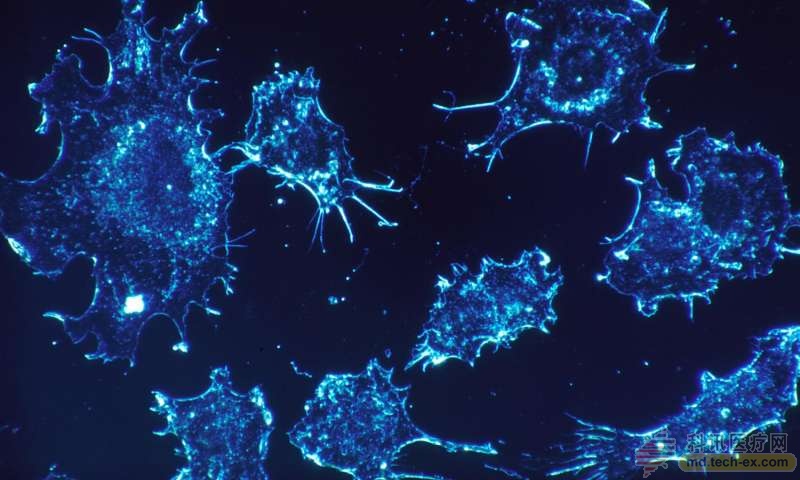Research finds how to avoid cancer recurrence accurately and efficiently
Release date: 2017-05-02

Scientists have found that unstable chromosomes in lung tumors increase the risk of cancer recurrence after surgery and have used this new knowledge to detect recurrence long before standard testing. These are the first findings from the TRACERx Lung Cancer Study funded by the UK's Cancer Research Center and were published today (Wednesday) in the New England Journal of Medicine and Nature.
TRACERx is the first study of real-time and specific details of cancer. Researchers will continue to track patients' recurrence or cure from diagnosis to postoperative surgery, and track and analyze cancer development.
Professor Charles Swanton, Principal Investigator at the Francesco Rick Institute in London, said: "The TRACERx study is the UK's largest investment in lung cancer research. This is the first time we have revealed tumor development and evasion treatment (the leading cause of cancer death). New insights.
"We believe that the valuable information generated in TRACERx will be obtained by research teams around the world to help us answer more questions about the biology of lung cancer. We only describe the possible performance in such details by observing tumor progression."
In a study published today in the New England Journal of Medicine, scientists analyzed tumors in 100 patients with non-small cell lung cancer (NSCLC). They found that the presence of unstable chromosomes is a driving force behind genetic diversity within the tumor.
They also showed that more than a quarter of patients with high rates of unstable chromosomes in the tumor may have a cancer recurrence or die of disease within two years.
This is because genetically diverse tumors are more likely to develop, spread and develop drug resistance, making it difficult for patients to treat cancer.
Dr. Mariam Jamal-Hanjani, lead author of the UCL Cancer Institute, said: "Determining the relationship between genetic diversity within a tumor and patient survival is one of the main goals of TRACERx, so finding evidence early in the study is really encouraging. .
"We have also determined through research what led to the development of lung cancer, providing us with insight into biological processes and shaping the possibility of disease progression.
With this discovery, the researchers conducted a second study, published today in the journal Nature, which investigates whether this genetic diversity can be clinically tracked.
By using 96 blood samples from 100 patients, they demonstrated that splicing of genetic defects present in non-small cell lung cancer can be monitored by using DNA positions obtained from blood ruptured from tumors (circulating tumor DNA ) .
They then analyzed the blood of 24 patients with non-small cell lung cancer (NSCLC) after surgery and accurately identified more than 90% of patients who were destined to have lung cancer recurrence, which was more than a year earlier than the clinical recurrence of the disease. .
This finding opens up many opportunities and roads to try to prevent recurrence for new lung cancer trials.
The benefit of monitoring from chemotherapy after surgery is currently not possible because patients often do not have any clinical symptoms of the disease.
With this in mind, the team also compared circulating tumor DNA levels in patients before and after surgery .
When the level of tumor DNA in the blood does not decrease after chemotherapy , the disease recurs, indicating that at least some of the tumors have become resistant.
These results provide a new means to monitor post-operative treatment and point to new treatments targeting targeted tumors that are often resistant to many existing treatments.
Dr. Christopher Abbosh, lead author of the Circulating Tumor DNA Research at the UCL Cancer Institute , said: "The future can provide patients with personalized treatments to target some of the cancers that recur after surgery.
"Using circulating tumor DNA , we can identify patients who may relapse. Even if there are no clinical symptoms, the treatment effect can be monitored.
"This reflects a new hope for lung cancer recurrence after surgery, and lung cancer recurrence usually occurs in more than half of all patients."
Professor Karen Warden, chief scientist at the British Cancer Institute, said: "Lung cancer has caused more than one-fifth of all cancer deaths in the UK, and survival has only improved over the past 40 years. Understanding these highly complex processes is Very challenging, the contributions of these two studies are an important step in the right direction.
"These findings can also help us determine how lung cancer responds to treatment, build a larger picture of the disease, and point out ways to develop new therapies, and it is vital to save more lives."
TRACERx collaborates with 225 researchers and clinicians from 19 centers across the country and is led by the Francis Crick Institute, UCL Cancer Institute, London University Hospital Biomedical Research Center, Royal Society, Achilles Supported by the Institute of Therapeutics, Illumina, Natera and Rosetrees Trust.
Sam Howard, CEO of Rosetrees Trust, said: "Rosetrees Trust is pleased to support Professor Swanton and the TRACERx project from the outset. We have always believed in the importance of this research, the team of outstanding researchers and their potential for human impact."
Source: Noble
Inoculation Loops,Calibrated Inoculation Loops,Gamma Sterile Inoculation Loops,As Calibrated Inoculation Loops
Yancheng Rongtai Labware Co.,Ltd , https://www.shtestlab.com
